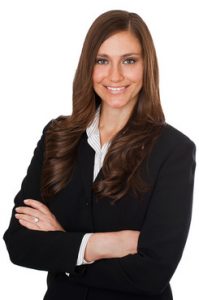How I Made Partner: Kilpatrick Townsend's Caroline Barbee
The trademark litigator in Los Angeles says she had to learn a lot about supervising and managing people: "It's psychology. You have to be very conscious not only of the type of person and communicator you're dealing with in the person you're supervising or managing, but also the type of person and communicator you are."
January 18, 2019 at 01:16 PM
8 minute read
Caroline “Carrie” Barbee, 39, Kilpatrick Townsend & Stockton
Office: Los Angeles.
Practice area: Trademark and copyright.
Law school: Southwestern School of Law, 2005.
How long have you been at the firm? Six years.
How long were you an associate at the firm? Four years.
Were you an associate at another firm before joining your present firm? If so, which one, how long were you there and when did you leave? Yes. Sedgwick, from 2005 to 2011, and Keats, McFarland & Wilson, from 2011 to 2013.
What year did you make partner at your current firm? 2017.
 Caroline Barbee.
Caroline Barbee.What's the biggest surprise you experienced in becoming partner? That I would feel like a first-year lawyer all over again, in the sense that there was a whole other skill set involved that I didn't have all that much experience with.
When I say other skill set, I'm referring to billing, budgeting, supervising and managing. The billing and budgeting is much easier to learn. It's just numbers. Once you do it a few times you get the hang of it.
Supervising and managing people, to me, is a little more difficult. It's psychology. You have to be very conscious not only of the type of person and communicator you're dealing with in the person you're supervising or managing, but also the type of person and communicator you are. Because at the end of the day, a huge part of being an effective manager is being an effective communicator (of instructions, of expectations, of criticism, and of praise). I've learned a lot about myself in the past two years in that sense—for the better.
What do you think was the deciding point for the firm in making you partner? As a general rule, I don't think there's ever just one thing that pushes a firm to make someone [a] partner. I think it's a combination of things, which was certainly the case with me.
I had a track record of being a hard worker, always exceeding the firm's billable hour expectations and willing to pitch in when someone needed help. My work product was good, which is obviously a must for anyone to make partner, but won't get you there alone. I had good instincts when it came to legal strategy, and had learned to integrate each client's business priorities into my advice. I was making nonbillable contributions to the firm by being involved on multiple firm committees, including leading the pro bono program in LA, which is a real firm priority. I was transitioning into supervisory roles on all of the matters/clients I was handling. And I had formed relationships with my in-house peers working at some of the firm's bigger institutional clients.
But above everything else, law firms are businesses. When it came time to make my case for partnership, I detailed the financial contributions I had made to the firm as an associate and counsel, and those I would make as a partner, so that decision-makers would see the tangible benefit of promoting me (in addition to all the intangibles I just described). I would say it was a combination of all of these things that got me across the finish line.
Describe how you feel now about your career now that you've made partner. That's a broad question, but I would say that overall I'm pretty proud of myself. I've been partner for a little over two years now. The first year was hard and a bit of a shock. On top of the new skill set I was trying to learn as a partner, I was also a new mom. And I was traveling a lot more than I ever had. There was a lot of learning and struggle to achieve balance going on that year.
The second year was definitely easier. I started to get the hang of the traveling and the billing and the supervising (and the mothering). By the middle of last year, I had a big litigation case settle, which opened up some free time. I started to feel like my feet were on the ground again and realized that I had actually made some forward progress in the new partner skills I was trying to hone. Add to that the fact that I love my area of practice—trademark and copyright enforcement and litigation—and my clients, and there's nothing I would change about my career or how I got here.
What's the key to successful business development in your opinion? This is going to sound cheesy, but for me the answer is relationships, relationships, relationships. And when I say relationships, I mean authentic relationships.
I remember being a first-year lawyer thinking that the idea of business development was so daunting. I didn't have any idea what it entailed and thought it involved writing articles and going to conferences and introducing myself to strangers I'd never met to try to sell them legal services. That sounded terrible to me because: first, I had no idea what I was doing, since I was only a first-year lawyer; and, second, I'm not a salesperson.
In my mind, I always thought I'd do much better if I could just make friends with people first. And that's exactly how I view business development now. I think it's important to have authentic relationships with clients—to try to get to know them and their business. It's much more pleasant to work with someone you know and like, who's invested in the same thing you're invested in. So that's how I approach business development, and how I think really successful business developers approach it as well.
What's been the biggest change, day-to-day, in your routine since becoming partner? That my day no longer revolves around being the primary working attorney sitting at my desk handling a few handfuls of matters. I'm now juggling triple that, in a supervising role, fielding lots of questions, reviewing lots of documents/emails, and counseling clients on how to handle the myriad of issues that come up on a daily basis. And with all that juggling, I have to remind myself to step back, think broadly, and connect the daily work to each client's unique vision.
Who had the greatest influence in your career that helped propel you to partner? Dennis Wilson, a partner at Kilpatrick Townsend. I started working with Dennis in 2012 after I made the move to Keats McFarland & Wilson (which has since merged with Kilpatrick Townsend).
I remember the first case we worked on together like it was yesterday. I had already been a litigator for six-plus years at that point, so I already had the fundamentals of litigation down. Dennis gave me the opportunity to run the case almost on my own, with him in the background offering me advice about strategy and client satisfaction. He was one of the best legal strategists I had ever worked with, and I had never seen anyone as dedicated to client service and relationships as he was.
He has since taken me under his wing and mentored me from associate, to counsel, to partner … and even to mother after I had my daughter three years ago. We talk almost every day—about life, about matters he's working on, about matters I'm working on. There's always a pearl of wisdom in every story he tells, and I find myself learning something useful almost every time we talk. He doesn't have to take the time out of his day for all of those conversations, but he does. And for that I am grateful.
What's the best piece of advice you could give an associate who wants to make partner? Always give 110 percent, make sure your work product is the best it can be (no matter what it is), and if you have a chance to connect with in-house counsel you're working with, take it.
Got a suggestion for a new partner to profile in this column? Contact [email protected].
This content has been archived. It is available through our partners, LexisNexis® and Bloomberg Law.
To view this content, please continue to their sites.
Not a Lexis Subscriber?
Subscribe Now
Not a Bloomberg Law Subscriber?
Subscribe Now
NOT FOR REPRINT
© 2025 ALM Global, LLC, All Rights Reserved. Request academic re-use from www.copyright.com. All other uses, submit a request to [email protected]. For more information visit Asset & Logo Licensing.
You Might Like
View All
Attorneys Leading $10M Pension Settlement Against CITGO Score $4M Payday
3 minute read
‘High Demand’: Former Trump Admin Lawyers Leverage Connections for Big Law Work, Jobs
4 minute read

Trending Stories
- 1Ex-Kline & Specter Associate Drops Lawsuit Against the Firm
- 2Am Law 100 Lateral Partner Hiring Rose in 2024: Report
- 3The Importance of Federal Rule of Evidence 502 and Its Impact on Privilege
- 4What’s at Stake in Supreme Court Case Over Religious Charter School?
- 5People in the News—Jan. 30, 2025—Rubin Glickman, Goldberg Segalla
Who Got The Work
J. Brugh Lower of Gibbons has entered an appearance for industrial equipment supplier Devco Corporation in a pending trademark infringement lawsuit. The suit, accusing the defendant of selling knock-off Graco products, was filed Dec. 18 in New Jersey District Court by Rivkin Radler on behalf of Graco Inc. and Graco Minnesota. The case, assigned to U.S. District Judge Zahid N. Quraishi, is 3:24-cv-11294, Graco Inc. et al v. Devco Corporation.
Who Got The Work
Rebecca Maller-Stein and Kent A. Yalowitz of Arnold & Porter Kaye Scholer have entered their appearances for Hanaco Venture Capital and its executives, Lior Prosor and David Frankel, in a pending securities lawsuit. The action, filed on Dec. 24 in New York Southern District Court by Zell, Aron & Co. on behalf of Goldeneye Advisors, accuses the defendants of negligently and fraudulently managing the plaintiff's $1 million investment. The case, assigned to U.S. District Judge Vernon S. Broderick, is 1:24-cv-09918, Goldeneye Advisors, LLC v. Hanaco Venture Capital, Ltd. et al.
Who Got The Work
Attorneys from A&O Shearman has stepped in as defense counsel for Toronto-Dominion Bank and other defendants in a pending securities class action. The suit, filed Dec. 11 in New York Southern District Court by Bleichmar Fonti & Auld, accuses the defendants of concealing the bank's 'pervasive' deficiencies in regards to its compliance with the Bank Secrecy Act and the quality of its anti-money laundering controls. The case, assigned to U.S. District Judge Arun Subramanian, is 1:24-cv-09445, Gonzalez v. The Toronto-Dominion Bank et al.
Who Got The Work
Crown Castle International, a Pennsylvania company providing shared communications infrastructure, has turned to Luke D. Wolf of Gordon Rees Scully Mansukhani to fend off a pending breach-of-contract lawsuit. The court action, filed Nov. 25 in Michigan Eastern District Court by Hooper Hathaway PC on behalf of The Town Residences LLC, accuses Crown Castle of failing to transfer approximately $30,000 in utility payments from T-Mobile in breach of a roof-top lease and assignment agreement. The case, assigned to U.S. District Judge Susan K. Declercq, is 2:24-cv-13131, The Town Residences LLC v. T-Mobile US, Inc. et al.
Who Got The Work
Wilfred P. Coronato and Daniel M. Schwartz of McCarter & English have stepped in as defense counsel to Electrolux Home Products Inc. in a pending product liability lawsuit. The court action, filed Nov. 26 in New York Eastern District Court by Poulos Lopiccolo PC and Nagel Rice LLP on behalf of David Stern, alleges that the defendant's refrigerators’ drawers and shelving repeatedly break and fall apart within months after purchase. The case, assigned to U.S. District Judge Joan M. Azrack, is 2:24-cv-08204, Stern v. Electrolux Home Products, Inc.
Featured Firms
Law Offices of Gary Martin Hays & Associates, P.C.
(470) 294-1674
Law Offices of Mark E. Salomone
(857) 444-6468
Smith & Hassler
(713) 739-1250









